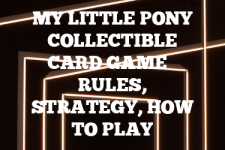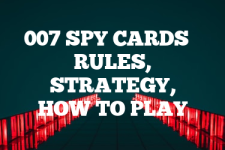A Guide to the Mythos Card Game – Rules, Strategy & Instructions
Introduction
Mythos is a game that takes you back to the eerie world of H.P. Lovecraft’s Cthulhu Mythos. It’s a collectible card game (CCG) that was pretty popular back in the ’90s. Players take on the roles of investigators trying to uncover ancient mysteries while keeping their sanity intact. The game is a mix of strategy and luck, with a strong emphasis on storytelling. It was first released in 1996 by Chaosium Inc., known for creating the role-playing game Call of Cthulhu. The artwork and themes are deeply rooted in Lovecraftian horror, which makes it a hit with fans of the genre, me included.

Unfortunately, if you’re looking to get into Mythos, you should know that the cards are no longer in print. However, you can still find them on the secondary market, and there’s a dedicated community of players out there. So, if you’re up for a bit of a hunt, you can still get your hands on these creepy cards and start playing.
Quick Tip for Mythos
Always keep an eye on your Sanity Points! They’re just as important as your Health Points, if not more so.
Rules for playing Mythos CCG
Understanding the rules is key to enjoying any game, and Mythos is no exception. Each player starts with a deck of 52 cards and a character card. The character card represents you, the investigator. The main goal is to complete adventures by gathering the required story cards and overcoming any challenges they present. You’ll also face off against monsters and may even have to deal with other players’ schemes.
During your turn, you can play cards from your hand, draw new cards, or use abilities. You can also engage in combat with monsters or other players. The game continues until a player completes enough story cards to win, or everyone else loses their sanity or health.
Here is a simplified list of rules for playing Mythos:
– Objective:
– The primary goal is to complete a story by playing Story cards and accumulating enough points to win the game.
– Setup:
– Each player begins with a deck of at least 52 cards.
– Players shuffle their decks and draw an initial hand of eight cards.
– Determine the first player through a random method.
– Other Rules:
– Players may only have one Investigator card in play at any given time.
– Some cards may have special abilities that can be activated or triggered during the game.
– If a player needs to draw a card and their deck is empty, they shuffle their discard pile to form a new deck.
– Interaction between cards, such as combat or spellcasting, follows specific rules provided with those cards.
Keep in mind that the official rulebook for Mythos CCG includes more detailed instructions and explanations for various card types, abilities, and scenarios, so it’s recommended to consult the rulebook for comprehensive gameplay guidance.
Card Types for Mythos
Mythos cards come in several types:
- Story Cards: These are the backbone of your deck. You need to collect and complete these to win the game.
- Ally and Item Cards: These provide you with additional abilities or bonuses to help you on your adventures.
- Event Cards: These represent unexpected happenings that can either aid or hinder players.
- Spell Cards: Powerful magic that can have a variety of effects on the game.
- Location Cards: Places where you can travel to complete story cards or gain other advantages.
When you’re just starting out, it’s a good idea to get a starter set. These pre-constructed decks are designed to be balanced and give you a taste of the game without overwhelming you with choices.
How to Play Mythos and Game Mechanics
The game mechanics of Mythos are what make it unique. Here’s a quick rundown:
Setup: Each player chooses a character card and builds a deck of 52 cards. Shuffle your deck and draw a starting hand of seven cards.
Gameplay: Players take turns performing actions such as playing cards, drawing cards, or engaging in combat. You can also attempt to complete story cards by meeting their requirements.
– Players take turns, each consisting of several phases:
– Draw Phase: Draw up to your maximum hand size, typically eight cards.
– Mythos Phase: Play a Mythos card (optional), which affects the game state or other players.
– Movement Phase: Move your Investigator card to a different Location card in play (optional).
– Adventure Phase: Attempt challenges at your current Location or with Allies, Artifacts, or Tomes you control.
– Story Phase: Play Story cards from your hand, provided you meet the requirements on the card.
– To play a card, you must pay its cost by discarding cards from your hand equal to the card’s cost.
– Certain cards remain in play to provide ongoing effects or to be used for specific challenges.
– Use Ally, Artifact, and Tome cards to help overcome challenges or to advance your own story.
End of the Game: The game ends when a player completes the required number of story cards or all other players have been eliminated. A player wins by completing a story, which involves collecting a certain number of points depicted on the Story cards. The required points are typically 20, but this can vary based on the agreed-upon rules or house rules before the game starts.
How to Win at Mythos CCG
Winning at Mythos requires a mix of strategy and adaptability. Beginners should focus on understanding the basic mechanics and building a balanced deck. Intermediate players can start to explore combos and more complex strategies. Advanced players will often try to anticipate their opponents’ moves and have contingency plans in place.
Overall, I recommend that a strategy and knowledge-driven approach is paramount. First, familiarize yourself with the game’s rules and the various card types—events, allies, artifacts, locations, and tomes—to understand how they interact within the game’s Lovecraftian universe. Building a balanced deck is crucial; it should align with your preferred playstyle while being adaptable to counter various opponents. Focus on synergy among your cards to create powerful combos and maintain resource efficiency.
During gameplay, manage your resources wisely, keeping track of your Sanity Points, which are essential for casting spells and using abilities. Prioritize learning your opponent’s strategies to anticipate their moves and prepare effective counters. Adaptability is key; be ready to adjust your tactics in response to the unfolding game state. By combining a strong deck, strategic foresight, and adaptability, you can increase your chances of dominating at Mythos CCG.
Best Strategies for playing Mythos Collectible Card Game
To really excel at Mythos, you need to master a few key strategies:
- Know your deck inside out. The more familiar you are with your cards, the better you can plan your moves.
- Control the pace of the game. Try to dictate when and where confrontations happen.
- Keep an eye on your opponents. Try to predict their moves and disrupt their plans.
- Balance your focus between completing story cards and maintaining your health and sanity.
Deck Building and Best Cards in Mythos
Building a strong deck is crucial in Mythos. You want a good mix of story, ally, item, event, and spell cards. Your deck should reflect your play style and strategy.
Best Cards in Mythos
Some of the best cards in Mythos include:
- The Necronomicon: A powerful spellbook that can turn the tide of the game.
- Professor Armitage: An ally who can help you in your research and adventures.
- Elder Sign: An item that provides protection against the forces of darkness.
Scenarios
Good and bad scenarios can arise in any game of Mythos. For example, you might find yourself low on sanity but rich in story cards. In this case, you might want to play more conservatively and focus on restoring your sanity. Conversely, if you have a strong position, you might want to press your advantage and try to complete your stories quickly.
Frequently Asked Questions about playing Mythos game
Here are some common questions and answers:
Q: How many cards can I play in a turn?
A: You can play as many cards as you want, as long as you have the resources to do so.
Q: What happens when I run out of cards?
A: If you can’t draw a card because your deck is empty, you reshuffle your discard pile into a new deck.
Q: Can I trade cards with other players?
A: Officially, no. But house rules can vary!
Additional Tips for Mythos Enthusiasts
Here are a few more tips to keep in mind:
- Always be aware of the current game state and adjust your strategy accordingly.
- Don’t underestimate the power of bluffing and psychological warfare.
- Remember that sometimes the best move is to do nothing and wait for a better opportunity.
External Links
If you’re interested in the lore behind Mythos, you might want to check out the works of H.P. Lovecraft. His stories are the foundation of the game’s universe. Here’s a link to learn more about Lovecraft’s influence on pop culture: H.P. Lovecraft in Popular Culture.
Card lists at Trade Cards Online

A digital native around since the early days of online gaming communities around 2001. An early contributor to the cult gaming site ClanTemplates, Adam has spent years giving free gaming resources to the community. With BoardCards, Adam is most experienced and commonly writing the articles on Strategy multi-player games like Settlers of Catan and Avalon. His first introduction to board games was via Mancala, an Egyptian-origin stone game and one of the oldest known games still played worldwide. Contact me via email



